
Andrew Fisher was an Australian politician and trade unionist who served as the fifth prime minister of Australia from 1908 to 1909, 1910 to 1913 and 1914 to 1915. He held office as the leader of the Australian Labor Party (ALP), and was particularly notable for leading Labor to its first federal election victory and first majority government.
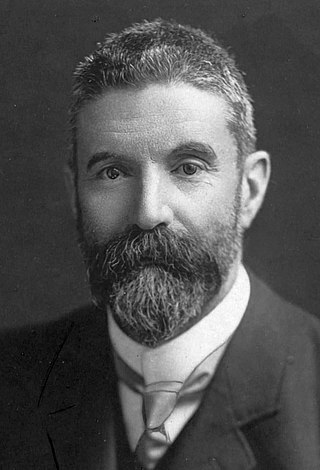
Alfred Deakin was an Australian politician, statesman and barrister who served as the second prime minister of Australia from 1903 to 1904, 1905 to 1908 and 1909 to 1910. He held office as the leader of the Protectionist Party, and in his final term as that of the Liberal Party. He is notable for being one of the founding fathers of Federation and for his influence in early Australian politics.

John Christian Watson was an Australian politician who was the third prime minister of Australia, in office from 27 April to 18 August 1904. He was the inaugural federal leader of the Australian Labor Party (ALP) from 1901 to 1907 and was the first member of the party to serve as prime minister.
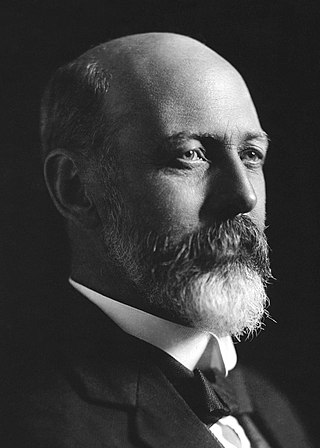
Sir Joseph Cook was an Australian politician who served as the sixth prime minister of Australia, from 1913 to 1914. He held office as the leader of the Liberal Party, having previously been leader of the Anti-Socialist Party from 1908 to 1909. His victory at the 1913 election marked the first time that a centre-right party had won an outright majority at an Australian federal election.
The Protectionist Party, also known as the Protectionist Liberal Party or Liberal Protectionist Party, was an Australian political party, formally organised from 1887 until 1909, with policies centred on protectionism. The party advocated protective tariffs, arguing it would allow Australian industry to grow and provide employment. It had its greatest strength in Victoria and in the rural areas of New South Wales. Its most prominent leaders were Sir Edmund Barton and Alfred Deakin, who were the first and second prime ministers of Australia.
The Liberal Party was a parliamentary party in Australian federal politics between 1909 and 1917. The party was founded under Alfred Deakin's leadership as a merger of the Protectionist Party and Anti-Socialist Party, an event known as the Fusion.

The Third Deakin ministry (Liberal) was the 7th ministry of the Government of Australia. It was led by the country's 2nd Prime Minister, Alfred Deakin. The Fourth Deakin ministry succeeded the First Fisher ministry, which dissolved on 2 June 1909 after the Protectionist Party and the Anti-Socialist Party merged into the Liberal Party "fusion" and withdrew their support in order to form what became the first majority government in federal Australian history. The ministry was replaced by the Second Fisher ministry on 29 April 1910 following the federal election that took place on 13 April which saw the Labour Party defeat the Liberals.
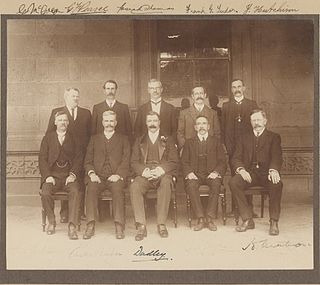
The First Fisher ministry (Labour) was the 6th ministry of the Government of Australia. It was led by the country's 5th Prime Minister, Andrew Fisher. The First Fisher ministry succeeded the Second Deakin ministry, which dissolved on 13 November 1908 after Labour withdrew their support and Alfred Deakin was forced to resign. The ministry was replaced by the Third Deakin ministry on 2 June 1909 after the Protectionist Party and the Anti-Socialist Party merged into the Liberal Party "fusion" and withdrew their support in order to form what became the first majority government in federal Australian history.
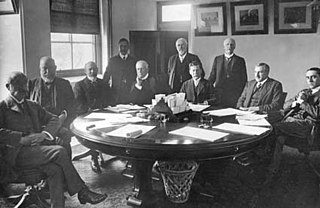
The Cook ministry (Liberal) was the 9th ministry of the Government of Australia. It was led by the country's 6th Prime Minister, Joseph Cook. The Cook Ministry succeeded the Second Fisher ministry, which dissolved on 24 June 1913 following the federal election that took place in May which saw the Liberals defeat Andrew Fisher's Labor Party - albeit with a one-seat majority. The ministry was replaced by the Third Fisher ministry on 17 September 1914 following the federal election that took place on 5 September which saw Labor defeat the Liberals.

The Third Fisher ministry (Labor) was the 10th ministry of the Government of Australia. It was led by the country's 5th Prime Minister, Andrew Fisher. The Third Fisher ministry succeeded the Cook ministry, which dissolved on 17 September 1914 following the federal election that took place on 5 September which saw Labor defeat Joseph Cook's Liberals. The ministry was replaced by the First Hughes ministry on 27 October 1915 following Fisher's retirement from Parliament to become the next High Commissioner to the United Kingdom.
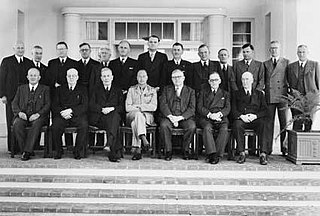
The Second Chifley ministry (Labor) was the 33rd ministry of the Government of Australia. It was led by the country's 16th Prime Minister, Ben Chifley. The Second Chifley Ministry succeeded the First Chifley ministry, which dissolved on 1 November 1946 following the federal election that took place in September. The ministry was replaced by the Fourth Menzies ministry on 19 December 1949 following the federal election that took place on 10 December which saw the Liberal–Country Coalition defeat Labor.

The Fourth Menzies ministry was the 34th ministry of the Government of Australia. It was led by the country's 12th Prime Minister, Robert Menzies. The Fourth Menzies ministry succeeded the Second Chifley ministry, which dissolved on 19 December 1949 following the federal election that took place on 10 December which saw the Coalition defeat Ben Chifley's Labor Party. The ministry was replaced by the Fifth Menzies ministry on 11 May 1951 following the 1951 federal election.

The first Whitlam Ministry (Labor) was the 47th ministry of the Government of Australia. Often known as the "two-man Ministry" or the "Duumvirate", it was led by the country's 21st Prime Minister, Gough Whitlam. The first Whitlam ministry succeeded the McMahon Ministry, which dissolved on 5 December 1972 following the federal election that took place on 2 December which saw Labor defeat William McMahon's Liberal–Country Coalition. The ministry was replaced by the second Whitlam ministry on 19 December 1972.
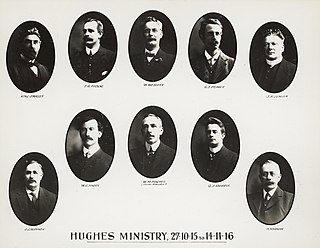
The First Hughes ministry (Labor) was the 11th ministry of the Government of Australia. It was led by the country's 7th Prime Minister, Billy Hughes. The First Hughes ministry succeeded the Third Fisher ministry, which dissolved on 27 October 1915 following Andrew Fisher's retirement from Parliament to become the next High Commissioner to the United Kingdom. The ministry was replaced by the Second Hughes ministry on 14 November 1916 following the split that took place within Labor over the issue of conscription. This led to Hughes and his supporters leaving the party to form the National Labor Party.

Sir William John Lyne KCMG was an Australian politician who served as Premier of New South Wales from 1899 to 1901, and later as a federal cabinet minister under Edmund Barton and Alfred Deakin. He is best known as the subject of the so called "Hopetoun Blunder", unexpectedly being asked to serve as the first Prime Minister of Australia but proving unable to form a government.

The 1990 Australian federal election was held in Australia on 24 March 1990. All 148 seats in the House of Representatives and 40 seats in the 76-member Senate were up for election. The incumbent Australian Labor Party, led by Bob Hawke, defeated the opposition Liberal Party of Australia, led by Andrew Peacock, with its coalition partner, the National Party of Australia, led by Charles Blunt, despite losing the nationwide popular and two-party-preferred vote. The result saw the re-election of the Hawke government for a fourth successive term.

The 1910 Australian federal election was held in Australia on 13 April 1910. All 75 seats in the House of Representatives, and 18 of the 36 seats in the Senate were up for election. The incumbent Liberal Party led by Prime Minister Alfred Deakin was defeated by the opposition Australian Labor Party (ALP) led by Andrew Fisher.
The history of the Australian Labor Party has its origins in the Labour parties founded in the 1890s in the Australian colonies prior to federation. Labor tradition ascribes the founding of Queensland Labour to a meeting of striking pastoral workers under a ghost gum tree in Barcaldine, Queensland in 1891. The Balmain, New South Wales branch of the party claims to be the oldest in Australia. Labour as a parliamentary party dates from 1891 in New South Wales and South Australia, 1893 in Queensland, and later in the other colonies.

The First Deakin government was the second federal executive government of the Commonwealth of Australia. It was led by Prime Minister Alfred Deakin, from 24 September 1903 until 27 April 1904. Deakin was the second Prime Minister of Australia, but served as Prime Minister again from 1905–1908 and 1909–1910 – see Second Deakin government and Third Deakin government.
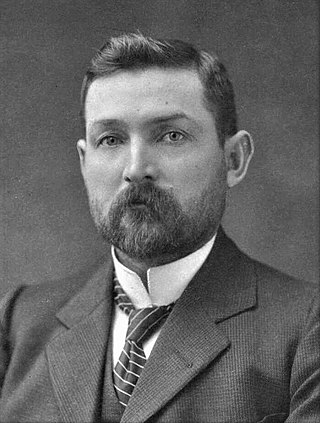
The Watson government was the third federal executive government of the Commonwealth of Australia. It was led by Prime Minister Chris Watson of the Australian Labor Party from 27 April 1904 to 18 August 1904. The Watson government was the first Labor Party national government in both Australia and in the world. Watson was aged just 37 when he became Prime Minister of Australia, and remains the youngest person to have held the post.



























